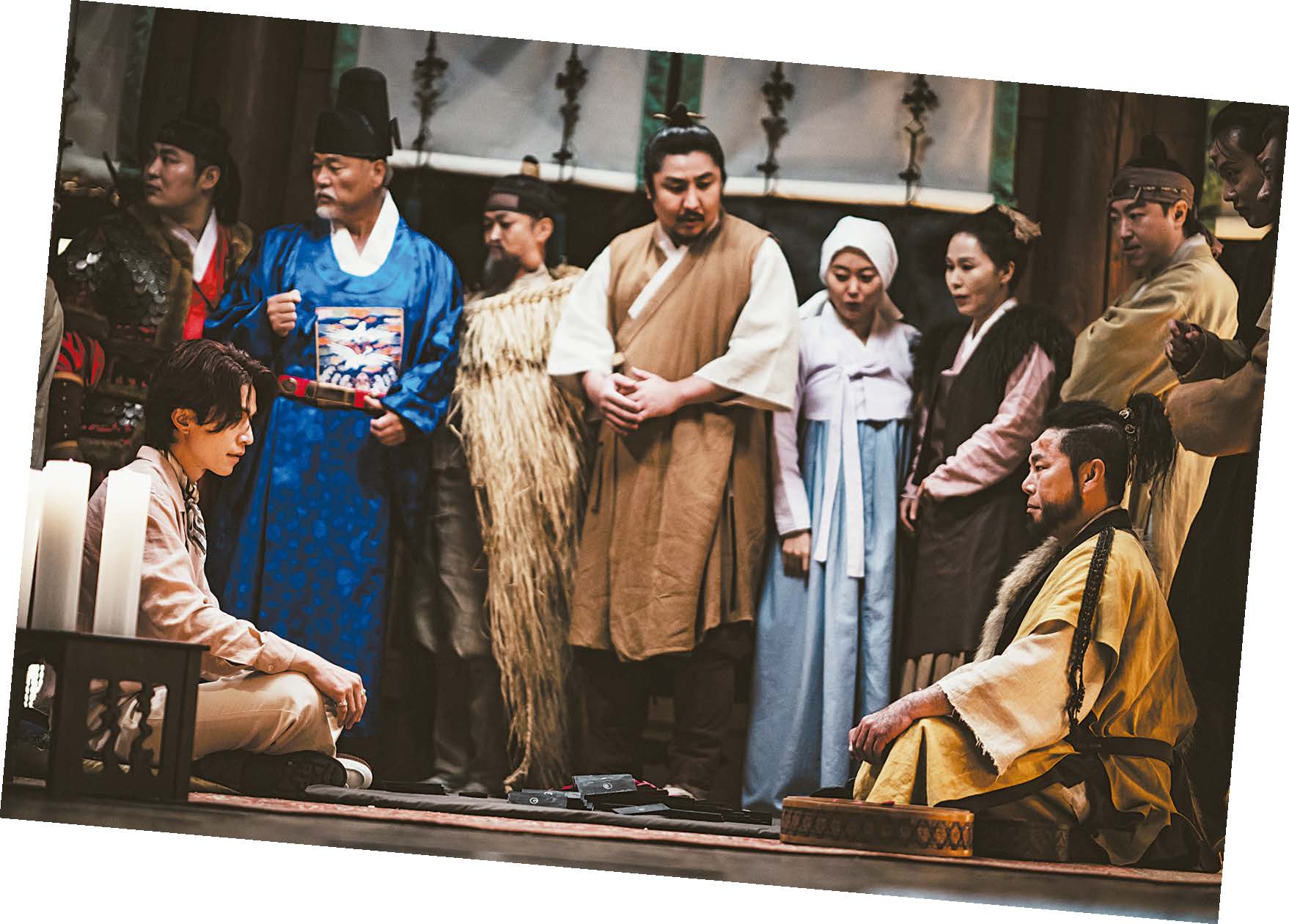Home / English News
In the era of AI, folk beliefs such as Evil Spirits and Gumiho are making a comeback
The drama ‘Evil Spirit’ and ‘Tale of Gumiho 1938’
- 미디어1 (media@koreatimes.net)
- Jul 06 2023 02:00 PM
Anxiety about a future where precious things disappear Folk beliefs, a way to reveal the existence of the vulnerable
#1. In the SBS drama 'Evil Spirit', Gusan Young (played by Kim Tae Ri) becomes possessed by a ghost after touching a red artifact inherited from her father. The ghost that possesses her is a spirit of a child, Taejagwi, who was starved to death in a Yeommae ritual, a practice where a shaman starves a child to death to elevate their spiritual power. 'Evil Spirit' pursues mystery by prominently featuring folk beliefs. This drama broke a 10% viewership rating in its second episode, showing its popularity.
#2. When a wrapped baby is abandoned at the doorstep and brought into the house, the house starts to accumulate wealth as if by magic. This baby is an Upshin, a bringer of wealth. The tvN drama 'Tale of Gumiho 1938' unfolds with a different indigenous god appearing in each episode. Full of folkloric elements, this drama (51.56 million minutes) was the second most-played content across all CJ ENM content on the online video service (OTT) Tving in June, beating popular shows like 'Traveling Dance Troupe' (23.62 million minutes).

In the drama 'Evil Spirit', Haesang (played by Oh Jung-se, right) tells Sanyeong (Kim Tae-ri) that she has been "possessed by an evil spirit." Provided by SBS.
Tragedy of infants unable to be 'named'
Dramas with folk beliefs as the main subject are heating up home theaters. Folk belief content, which was mainly introduced through theaters, OTT, and cable channels, with low thresholds for censorship and genre, has now expanded to terrestrial channels, gaining momentum.
In an era of IT revolution where artificial intelligence (AI) writes plays, why are Yeommae and Upshin popular? The reason why dramas with folk belief themes are suddenly popular is not unrelated to our society's reality. As concerns grow over the collapse of systems supporting the country due to problems such as low birth rates and provincial disappearance, the fear of extinction first strikes the socially vulnerable. The protagonist of 'Evil Spirit', who is possessed, is a student preparing for employment while earning tuition as a designated driver. As despair grows in reality, it is natural to question one's existence. 'Tale of Gumiho 1938' goes back to 1938, when Japanese rule was in full swing, and the three Mountain Gods (played by Lee Dong Wook, Kim So Yeon, Ryu Kyung Soo) retrieve the lost spirit of Joseon.
The reason why these summonings of old folk beliefs continue in 21st-century popular culture is anxiety about a future where what needs to be protected disappears without even a chance to reach out. As seen in the tragic case of infant murder and abandonment, where even birth registration has not been done, the tragedy of those who cannot be 'named' in society is dire. Folk beliefs are the only channel through which the common people, who are treated as invisible in society, can reveal their existence.
As the wave of K-contents rises and interest in Korean traditions grows overseas, the development of stories based on folklore is also actively underway. "The number of scripts based on folk beliefs has increased compared to the past," said a representative of a studio producing dramas and movies, hinting that they are paying close attention from the perspective of "glocalization" (globalization of local culture).

In the drama 'Tale of Gumiho 1938', the indigenous gods are playing a game with each other. Provided by tvN.
"'Don't look back,' warned writer Kim Eun-hee."
So how were these dramas based on folk beliefs created? Writer Kim Eun-hee, who wrote 'Evil Spirit', began studying folklore by perusing related papers in the summer of 2021. She also visited the Department of Folklore at Andong University and the National Folk Museum. On July 1st episode of 'Evil Spirit', residents of Baekchagol Village prepare a Dangje Festival to expel a guest ghost. Kim noted, "I wrote this episode after witnessing the Dangje Festival performed on a beach in Chungnam, Hongseong." She added, "The spiritual leader warned, 'If you look back, you'll be possessed by a vengeful ghost.' I remember clearly that I didn't dare to look back and quickly left the place."
Writer Han Woo-ri, who consecutively penned 'Tale of the Nine Tailed' (2020) and 'Tale of Gumiho 1938', started delving into folklore in 2018. Her debut drama 'Children of a Lesser God', where the protagonist was a shaman's granddaughter (played by Kim Ok-bin), marked the beginning of this journey. Coming from a background of creating the current affairs and culture show 'I Want to Know That', she spent the next five years gathering data on seasonal customs, village and shamanic beliefs, and even compiled a 'Folklore Encyclopedia'. Among all her research, she cherishes most the recorded files of rural elders narrating legends. Han said, "These stories, often lacking a clear beginning, middle, and end, and sometimes even contradicting themselves, felt truly heartwarming."
In 'Tale of Gumiho 1938', the mountain god Lee Yeon (played by Lee Dong-wook) muses after sending off an Upshin, "During those exceedingly impoverished times, Koreans would call an abandoned baby an Upshin and took care of it. This child, believed to bring fortune, saved the lives of countless babies who were on the brink of starvation." Han stated, "I crafted the Upshin episode because I wanted to write this narration," and added, "Often disparaged as mere superstition, I found our folk beliefs to be genuinely pure and benevolent."
www.koreatimes.net/English News
미디어1 (media@koreatimes.net)


